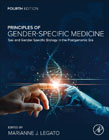
Principles of Gender-Specific Medicine: Sex and Gender Specific Biology in the Postgenomic Era
Legato, Marianne J.
Awarded with the 2018 Prose Award in Clinical Medicine, the third edition of Principles of Gender-Specific Medicine explored and described exciting new areas in biomedicine that integrated technology into the treatment of disease and the augmentation of human function. Novel topics such as the sex-specific aspects of space medicine, the development and the use of genderized robots and a discussion of cyborgs were included in the third edition, providing a preview of the expanding world of sex-specific physiology and therapeutics. This Fourth Edition is a continuation of the mission to trace the relevance of biological sex to normal function and to the experience of disease in humans.We are now twenty years into the postgenomic era. The investigation of how the genome produces the phenome has led to fascinating insights as well as yet unanswered questions. Principles of Gender-Specific Medicine, Fourth Edition, has a central theme: discuss advances in understanding the role of epigenetics in regulating gene expression in a dynamic, sex-specific way during human life. It explores the protean role of epigenetics in human physiology, the relevance of environmental experience to human function, the therapeutic promise of cutting-edge methodologies like gene manipulation, the preparation of humans for space travel, the use of artificial intelligence in detection and therapeutic decisions concerning disease states, the possibilities for technological support of not only compromised individuals but of the augmentation of human function, and an analysis of the benefits, limitations and issues that surround our current expectations of personalized medicine. Covers the most important developments in biomedical research in the past decade, with a thoughtful analysis of how they impact patient care Discusses the feasibility and usefulness of personalized medicine, the limits and promise of genetic editing, the basis for variation in sexual identity and how artificial intelligence and technology will affect basic human function as well as correcting disability Promotes and facilitates discussions about the ethics and governance issues that surround much of what science is now able to do at the most basic levels of human's physiology INDICE: Section 1: The new science of epigenetics and the sex-specific mechanisms of gene regulation 1. Overview of various perceptions of epigenetics 2. Sex differences in gene expression in the brain 3. Epigenetics of sex differences in the brain 4. Advances in studying epigenetics biomarkers of prognostic potential for clinical research, epigenetics of rRNA Genes 5. Single cell look at epigenetic inheritance mechanisms 6. Review of the epigenetics evolution 7. Epigenetics of human disease 8. Malignant transformation and epigenetics 9. The role of transposable elements in human disease Section 2: How is sex established? 10. Searching for sex in the genome 11. Concept of the sexome? 12. Ovarian formation 13. How XX and XY supporting cells initiate sex determination Section 3: What is the role of the environment in shaping the phenome? 14. Early life environment and the epigenome 15. Mechanisms of transmission of sex-specific epigenetic changes to subsequent generations 16. Gene-environment interactions related to epigenetic and classical genetic mechanisms 17. Environmental epigenetics 18. The concept of the exposome Section 4: New concepts of the biology that produces deviations in sexual development, sexual dysphoria and homosexuality 19. The role of epigenetics in delineating the biological basis of human sexual orientation 20. The epigenetic factors that may canalize homosexuality 21. Molecular biology of sexualization of the brain Section 5: Commentary on the much-touted discipline of personalized medicine 22. Deciphering individual molecular biology to prevent, detect and treat human disease 23. Traditionally constructed large epidemiologic studies 24. Geneome sequencing and analysis at the expense of more useful large epidemiologic studies 25. Biological sex in the pursuit of personalized medicine 26. Underserved communities and personalized medicine 27. Value, pitfalls, and opportunities of pursuing personalized medicine Section 6: The integration of technology into the human body 28. The use of AI/technology to diagnose and treat disease 29. Cyborgs and the evolution of man + machine 30. Overview of the developments and achievements in orthotic and prosthetic technology 31. Use of brain implants to treat neurological problems 32. The Use of technology to augment the human competence 33. The fascinating concept of the post human 34. The future of human intelligence 35. Neural interface that will last a lifetime to generate neural prosthetic devices to possibly enhance brain function 36. Application of cyborg technology and theory to space travel by humans 37. Use of personalized medicine to supplement the lack of sex-specific information in the young field of space medicine Section 7: CRISPR-Cas9 technology 38. Problems/inadequacies/limitations of CRISPRP-Cas9 Genome Editing 39. iochemistry and Molecular Biology Education 40. First steps on making changes in mitochondrial DNA 41. Mitochondrial genetic manipulation 42. Strategy for manipulating the mitochondrial genome with cytidine deaminase toxin 43. The ethics and governance of genetic engineering
- ISBN: 978-0-323-88534-8
- Editorial: Academic Press
- Encuadernacion: Rústica
- Páginas: 800
- Fecha Publicación: 01/03/2023
- Nº Volúmenes: 1
- Idioma: Inglés
